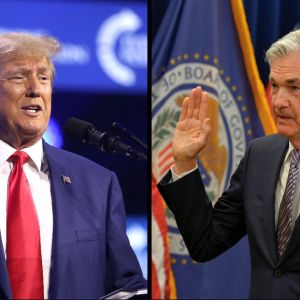As many economists know, Federal Reserve Chairman Jerome Powell and the US President-elect Donald J. Trump do not see eye to eye on practically everything. The political “indifference” is nothing short of pronounced; Trump has been asked if he would request Powell to leave office, to which he said, “No I wouldn’t.” President-elect Trump is preparing to assume office. However, his commitment to mainstream crypto adoption and aggressive spending cuts collides with Powell’s more cautious, inflation-focused approach. This simmering tension has been brewing since the election, as speculation mounted over how Trump’s policy priorities; lower taxes, stricter immigration controls, higher tariffs, and a push for digital asset integration, would align with the Federal Reserve’s mandate of price stability. Powell’s recent remarks following the Federal Open Market Committee (FOMC) meeting reveal a central bank bracing for a policy environment rife with uncertainty. Powell’s cryptic stance on crypto and policy rates At the FOMC meeting, the Federal Reserve cut its policy rate by 25 basis points, as anticipated. Yet, the move was overshadowed by the central bank’s shifting projections. The Summary of Economic Projections now forecasts a 3.9% policy rate by the end of next year, signaling two additional rate cuts. Inflation expectations for 2025 climbed to 2.5%, while uncertainty surrounding inflation projections surged, with a broader range of potential outcomes. Powell addressed these projections cautiously, attributing part of the uncertainty to the impact of Trump’s potential tariffs and other economic policies. “We don’t know when we will face that question,” Powell stated, emphasizing the Fed’s focus on studying how tariffs could drive inflation. However, he conceded that some FOMC members had tentatively factored in the possible effects of Trump’s policies, likening the situation to “driving on a foggy night.” While Powell’s comments seem measured, critics argue that they betray a political bias. By incorporating speculative estimates of Trump’s economic agenda into their forecasts, the Fed may have overstepped its neutral role, a criticism Trump and his camp have been more than blithe to exploit. Crypto at the crossroads: No strategic reserve? We can’t ignore the big elephant in the room, a particularly contentious issue: Trump’s suggestion to build a “Strategic Bitcoin Reserve.” JUST IN: 🇺🇸 Federal Reserve Chair Jerome Powell says the Fed is “not allowed to own Bitcoin.” #JeromePowell #FED #FOMC #InterestRates pic.twitter.com/Atq66Kl5VY — Crypto Seth 🌿 🦄 (@waleefin) December 19, 2024 In a press briefing yesterday, Powell dismissed the idea outright, stating, “We’re not allowed to own Bitcoin,” while reiterating that any legal changes to permit such a reserve would require Congressional approval. The comments triggered a pullback in Bitcoin prices, which had rallied sharply post-election amid optimism over Trump’s crypto-friendly agenda. Bitcoin price dips. Source: CoinMarketCap Powell’s skepticism echoes the Fed’s broader caution toward digital assets, and we all know that Trump does not share the same sentiment. The chairman has consistently opposed the idea of federal involvement in cryptocurrencies, framing it as a matter best left to Congress. This cautious stance places Powell at odds with Trump, who sees digital currencies as a tool for innovation and economic growth. We have to wait to see if it is a divide that could further strain the relationship between the White House and the central bank. Make no mistake about it: Bitcoin has been around for more than a decade, and if he didn’t support it before, Fed chair Jerome Powell would never go pro-crypto. Trump’s frustration with Fed independence The conflict is not limited to crypto policy. Trump has a long history of criticizing Powell’s leadership, accusing the Fed of being “political” and suggesting that its rate cuts were timed to benefit electoral outcomes. Despite his criticisms, Trump has also voiced frustration that Powell’s rate cuts did not go far enough, highlighting his desire for more influence over monetary policy. “I feel the president should have at least a say in there,” Trump declared in August, arguing that his business acumen made him better qualified to guide rate decisions than Fed officials. This perspective further outlines Trump’s broader ambition to reshape the central bank’s independence, a move Powell has publicly opposed. “Independent central banks typically have lower inflation,” Powell said in September, defending the existing institutional framework. He stressed the importance of insulating monetary policy from political influence, calling it “a good institutional arrangement” that benefits the public. Political overreach or necessary reform? Trump’s assertion that the Fed should consult him on interest rate decisions raised eyebrows across the political spectrum. Critics warn that undermining the Fed’s independence could destabilize financial markets and erode public trust in monetary policy. Yet, Trump’s supporters, including Tesla CEO Elon Musk , argue that his push for greater oversight reflects legitimate concerns about a central bank they perceive as out of touch with Main Street. The tension between Trump and Powell is simply a battle over who has the power to shape economic policy. Powell insists that the Fed is committed to price stability, even as it invites accusations of political bias. On the other hand, Trump’s more aggressive, interventionist stance echoes his belief in the need for a radical rethinking of monetary policy. The stakes are undoubtedly high for both men. It could go two ways: A constructive dialogue or an outright confrontation about whose policies are the “best for America.” From Zero to Web3 Pro: Your 90-Day Career Launch Plan









